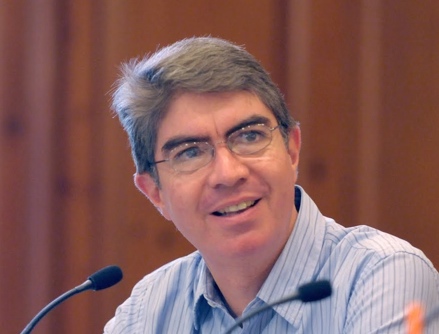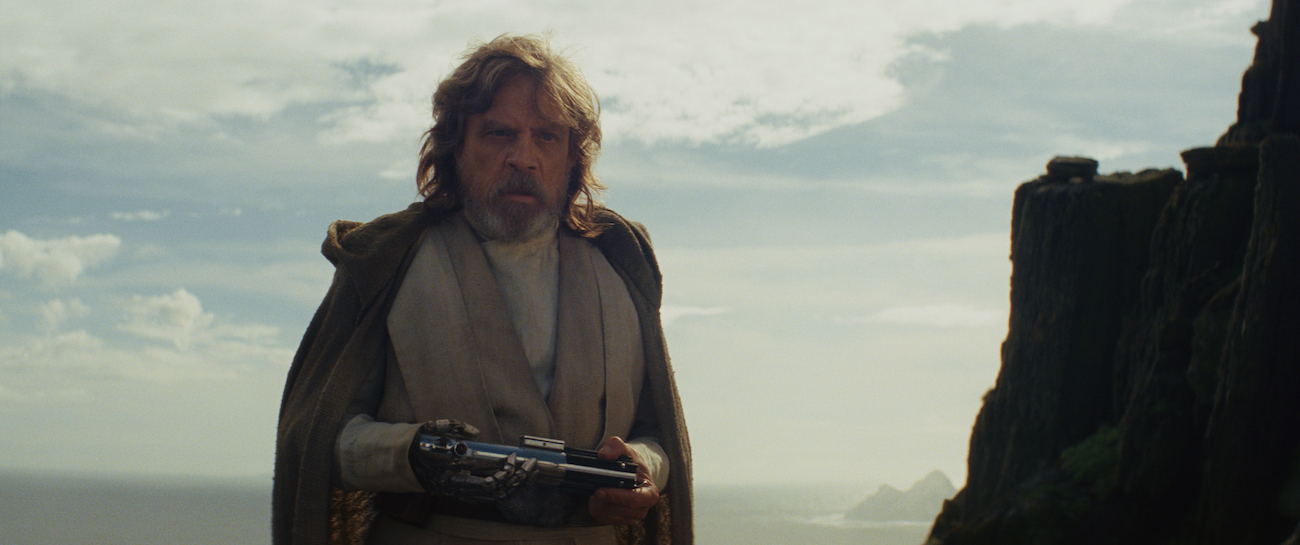Perhaps my greatest grievance with “The Force Awakens” when it came out a couple years ago was how much it felt like a remake of the very first “Star Wars” movie. Both had a talented but naïve character living on a desert planet, longing to find his/her true calling. Both had a Galactic Empire-type enemy trying to destroy a freedom fighting force. Both had the rebels blowing up a planet-busting Death Star. With this in mind, I wasn’t all that that surprised to find that Rian Johnson’s “Star Wars: The Last Jedi” is very much a new “The Empire Strikes Back.” This does of makes some sense, after all, if you want to emulate a “Star Wars movie,” why not choose most every fan’s favorite entry in the series?
And so, as “The Last Jedi” opens, we find a new, decimated rebellion led by General Leia (Carrie Fisher) on the run from the First Order (this makes me wonder why blowing up a Death Star never seems to bring any long term prosperity to the rebels). We also have the now old Jedi Master (Luke Skywalker) training newcomer Rey (Daisy Ridley) as she is being tempted by the dark side of the force via the evil Kylo Ren (Adam Driver). There is, however, a significant variation to the Jedi Master of the original series by having Luke discard the Jedi ways as too arrogant, never mind that it was the Jedi ways that led Luke to save the rebellion and crush the Empire a long time ago in a Galaxy far, far away, (or back in 1983, to be more precise).

There is little doubt that “The Last Jedi” is a vast improvement over “The Force Awakens.” The film’s 154-minute running time went by in a hurry and I was surprised to see how well most of its action sequences worked. The initial battle was exciting if not terribly original. Leia’s unconscious survival in the void of space thanks to her Force related abilities was unexpected and a great visual. The casino/race track was great fun though I’m not sure even Benicio del Toro knows if he played a good or a bad guy. The blowing up of the few remaining rebel ships was gripping and so was the final escape by the rebels, even if C-3PO’s calculation of their survival odds was more than a bit pessimistic. The special effects in the movie were spectacular as always and I can say that I left the theater rather happy. Still, I did notice that by the time I got to my car I had pretty much “let go” of the movie and after a few days of meditating, I can only explain my indifference by reflecting on what made the original films great.
First off, I don’t think it was solely the visual effects that made these movies special and it hasn’t gotten any easier for this new generation of “Star Wars” filmmakers. There are just too many movies with state of the art visual effects these days and they are no longer in a class by themselves. It’s not like they are doing anything that “Star Trek” or every other comic book movie isn’t. That’s is not to say the visual effects in “The Last Jedi” are anything but impeccable. They are also nothing more than one would expect going into the theater, even if they easily surpass those that blew audiences away 40 years ago.
Further, it’s not that the George Lucas “Star Wars” movies were perfect to begin with, and that creating romantic relationships and humor were never his strong point. And yet, whatever their faults, all six of the his “Star Wars” movies expertly prepared the audience for a defining moment at their closure where the stakes couldn’t be higher. How would “old man” Kenobi fare against the imposing Darth Vader (even in the latter’s powers seemed limited compared to those he displayed at the end of the recent “Rogue One”?) Could the seemingly innocent Luke Skywalker survive a confrontation with Darth Vader? Would he be able to prevail in a later rematch with his father? Even a Darth Maul or a Count Dooku made for formidable challenges and despite what the prequel detractors may say, at no moment did the stakes feel higher as when Yoda faced a pre-Emperor Dark Sidious in “Revenge of the Sith,” even when we could easily anticipate the result of their confrontation before it even took place.

It is in the absence of these type of relevant confrontations where the mediocrity with the new “Star Wars” lies, something that derives directly from its new characters. The First Order is menacing enough but nothing more than a Galactic Empire 2.0 which still consists of movie Nazis in space uniforms (it would even seem they share tailors with their predecessors). Rey, Finn, Poe Dameron and Vice Admiral Holdo are all reasonably good characters, but none that could be called indispensable. The new Emperor, embodied in Supreme Leader Snoke, did seem like a frightening figure for a while, that is until he failed to learn anything from sneaky Kylo’s love for pulling out hidden light sabers (see Han Solo’s demise). Snoke’s demise is a genuinely unexpected moment in a movie that mostly follows old formulas but when he leaves the picture, there’s no one to be too scared of anymore. Kylo Ren’s complex, three-dimensional heavy with daddy issues doesn’t make for an imposing “Star Wars” villain. Maybe his writers should ask themselves what Darth Vader would do under certain situations once in a while. I suppose that’s why “Rogue One” has been the best new “Star Wars” movie. At least they got the villains right. If you are going to rid yourself of an iconic character such as Han, Yoda, Vader, Obi Wan, you better make sure there is a worthy one ready to take his place.
On the other side of the Force, Jedi Master Luke Skywalker now has inconsistencies of his own as the movie hints about his dishonesty regarding the events that surrounded Kylo Ren’s turn to the dark side. His rejection of the Jedi ways feels much too contrived and these new traits damage our memories of the great character from the earlier movies. His death scene is beautifully crafted, with obvious parallels to other classic demise scenes such as Obi Wan’s (sacrificing his life for the young rebels) and Yoda’s (in its look). But it comes from exhausting himself to death by tele-transmitting his presence in a big duel with Kylo Ren (who should have guessed something was off since he was doing the exact same thing with Rey earlier in the movie). I’m sure Tele-transmission via the Force must be really exhausting but it hardly feels like a worthy ending to the person who was perhaps the central character in the saga.

Another problem with the new series is how they’ve wasted their chance of properly disposing of the original trilogy’s characters, from Luke’s clearly premature passing (though his ghostly presence is bound to return at some point), to Han not being able to figure out what everybody in the audience knew Kylo was bound to do, to Leia’s own departure, with Carrie Fisher’s untimely death leaving the filmmakers with few options. Just remember how the Bond series brought the M and even the Q characters to their ends or even how “The Godfather III” did the same with Michael Corleone. We’re now heading towards “Episode IX” with only Chewbacca and the droids remaining from the original series and I can’t say I’m particularly looking forward to another Rey vs. Kylo Ren confrontation, which is where we seem to be headed. “The Last Jedi”‘s astounding success has had more to do with the series’ reputation than with any particular accomplishments.
From my first viewing of “The Empire Strikes Back” in 1980, I can remember the great anguish derived from realizing the movie was about to end and there was still no resolution in sight. Han may not be freed from Jabba the Hut and Luke may or may not be Darth Vader’s son. Waiting three years for the answers in “Return of the Jedi” felt like an eternity. Sadly, this will just not be the case before the next “Star Wars” movie opens.












